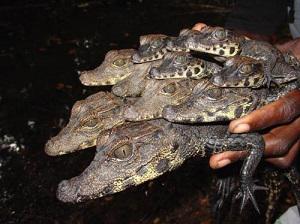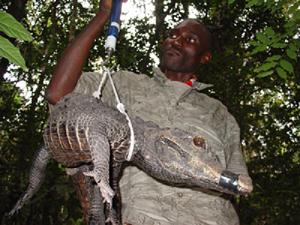Mitchell Eaton
Other projects
6 Jul 2009
Long-Term Monitoring and Management of Wildlife Resources in the Lac Tele Community Reserve, Republic of Congo: Fisheries, Bushmeat and Crocodiles
In this project I am studying the population ecology of dwarf crocodiles and levels of subsistence and commercial harvest to evaluate the impact of current and future exploitation on population sustainability.

The dwarf crocodile is a top aquatic predator in Central African swamps and flooded forests. It is a poorly understood species in an understudied ecosystem. The dwarf crocodile is a significant food resource for many rural Africans and has also become an important economic component of the commercial bushmeat trade. Unlike other bushmeat species, the dwarf crocodile can be captured and transported live over long distances, an important characteristic for commercial trade in regions where refrigeration is often unavailable. Intensified commercial hunting, recognized as one of the most significant threats to tropical forest wildlife, will increase with human population growth, urbanization and greater availability of transportation. I am studying the population ecology of dwarf crocodiles and levels of subsistence and commercial harvest to evaluate the impact of current and future exploitation on population sustainability.

In Loango National Park, on Gabon’s central coast, I am collecting baseline ecological, population and genetic data on crocodile populations using a combination of night-time surveys of forest rivers and swamps, capture-mark-recapture methods, and radio telemetry. Demographic data on survival and reproduction will be used to construct population dynamic models to estimate growth rates and the influence of particular size-classes on population dynamics. Migration rates and movement patterns, important for determining population units and the scale of management, are being evaluated by estimating the rate and degree of gene flow between populations and through annual movement patterns revealed by radio telemetry.
To evaluate harvest levels, the importance of crocodiles relative to other protein sources, and the dynamics of commercial trade, I have established a second field site in the Lac Tele Community Reserve (LTCR) in the Likouala swamp forest of northern Republic of Congo. The Reserve contains important habitat for large mammals (including elephant, gorilla, chimpanzee, and buffalo), fish and all three species of African crocodiles. The LTCR also includes 26 villages and supports a population of approximately 16,000 humans who rely on fish and wildlife as their principle economic and protein source. Lac Tele’s mission is to promote sustainable resource use by local villages. I am working with the LTCR Project to design and implement a program to monitor subsistence and commercial use of fish, crocodiles and other wildlife in the Reserve. Harvest data will be incorporated into population demographic models to reflect added mortality, seasonality of harvest, and hunter size-selection biases.